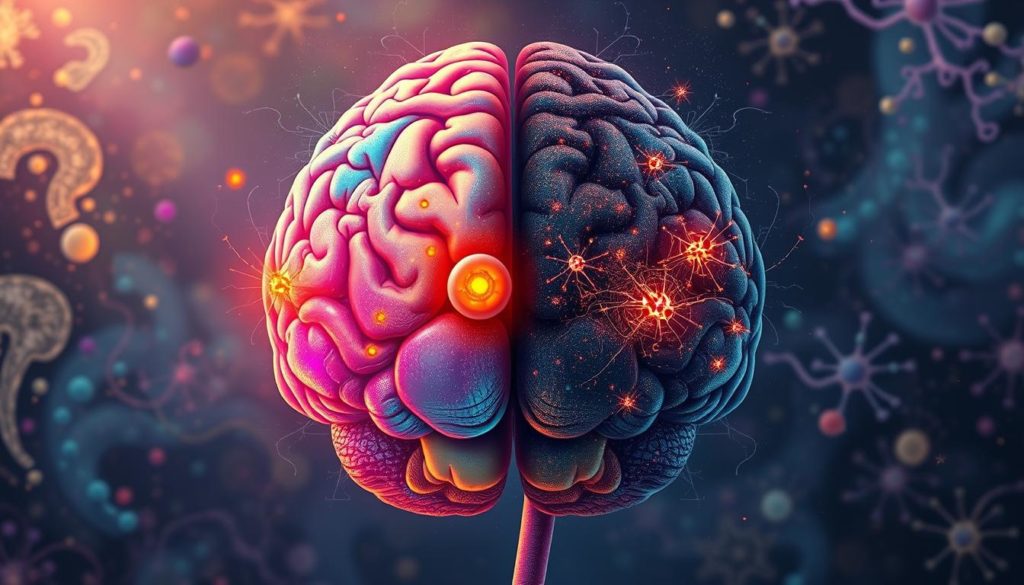Did you know that nearly 6 million Americans are living with Alzheimer’s disease? Up to 90% experience significant personality shifts as their condition progresses. Understanding Alzheimer’s goes beyond recognizing memory loss. It’s about seeing how it deeply affects a person’s character and behavior. These shifts in personality not only impact the individuals diagnosed but also their families and caregivers.
Alzheimer’s disease can lead to big changes in how a person reacts, interacts, and feels. Getting to know Alzheimer’s includes understanding these changes as a key part of the disease. We look into the subtle behavioral symptoms to offer insights on why they happen and how they show up. By knowing the nature of these personality shifts, we can offer better support. This helps us care more empathetically.
Introduction to Alzheimer’s Disease
Alzheimer’s Disease is a progressive neurological disorder. It affects millions around the world. A decline in memory, thinking, and reasoning skills marks it.

What is Alzheimer’s Disease?
Alzheimer’s Disease is the most common form of dementia. It makes up 60-80% of dementia cases. Though it mainly affects older adults, it is not just part of getting older. The disease harms communication between brain cells, causing them to die and the brain to shrink.
Early Signs and Symptoms
Spotting Alzheimer’s early signs is key to getting help soon. Early Signs of Alzheimer’s include losing memory that affects daily life and having trouble with plans or problems. Also, there’s difficulty in doing tasks that were once easy, confusion about time or place, and changes in mood or personality.
How Alzheimer’s Affects the Brain
The way Alzheimer’s changes the brain is severe. It results in amyloid plaques and tau tangles that hurt and kill brain cells. This Alzheimer’s Brain Impact breaks the connection between cells. That leads to major cognitive loss and changes in how one acts.
The Science Behind Alzheimer’s Personality Changes
To understand the personality changes in Alzheimer’s, we must look at the science. Changes in brain function and chemical balances are key. They greatly influence these shifts in behavior.
Impact on Brain Function
Alzheimer’s leads to a big drop in how the brain works. It attacks and kills neurons, making brain cells struggle to talk to each other. When it gets worse, parts of the brain that govern our behaviors and selves get hit hard. This destruction in neurons changes how the brain operates, causing more anger and unpredictable moods.

Chemical Changes in the Brain
Chemical shifts in the brain are also a big part of Alzheimer’s. An imbalance of neurotransmitters, like acetylcholine, is very important. These chemicals help with memory and learning. When they’re thrown off balance, thinking skills go downhill, making Alzheimer’s symptoms worse. This leads to memory issues and big changes in personality, including confusion and distrust.
Types of Personality Changes in Alzheimer’s
Alzheimer’s disease leads to many emotional changes and personality changes. These changes differ from person to person. They depend on how far the disease has progressed and the person’s history.
Common Behavioral Symptoms
There are many behavioral symptoms in Alzheimer’s patients. Some common ones include:
- Increased agitation and restlessness
- Repetitive questioning
- Wandering or pacing
- Suspicion and paranoia
These Alzheimer’s behavior changes are tough on caregivers and families. It’s key to spot and understand them early.
Mood Shifts and Emotional Changes
Emotional changes are also common in Alzheimer’s patients. They often go through:
- Periods of depression and apathy
- Unexpected irritability or anger
- Extreme anxiety
Such Personality Changes in Alzheimer’s are hard for the patient and their families. Knowing about these changes can aid in better care and coping strategies.
Why Mood Shifts Happen in Alzheimer’s Patients
It’s interesting to look into why Alzheimer’s patients often have mood shifts. It’s about how their cognitive decline and environment affect each other. This combination leads to various emotional reactions.
The Role of Cognitive Decline
When someone has Alzheimer’s, their emotional stability takes a hit due to cognitive decline. Their brain doesn’t work as well, causing memory loss and confusion. This often makes them feel irritable or frustrated. These changes in how their brain functions are big reasons why their moods can shift a lot.
“The progressive loss of brain function is a primary factor in the emotional and behavioral changes seen in Alzheimer’s patients,” notes the Alzheimer’s Association.
Environmental Triggers
What’s around a person with Alzheimer’s also affects how they feel. If things suddenly change, or there are loud noises or new places, they might feel anxious or upset. Having a calm and supportive space is key. It helps lessen these triggers and makes handling mood shifts in Alzheimer’s a bit easier.
Impact of Alzheimer’s on Family and Caregivers
The challenge of caring for someone with Alzheimer’s deeply affects the family. The Alzheimer’s Family Impact touches everyone as daily challenges arise. These include managing tough behaviors and taking care of personal needs, too. On top of physical tasks, there’s a big emotional weight. Family members often feel grief, frustration, and loneliness.
Handling these caregiver challenges often leads to feeling very tired emotionally. This happens as loved ones deal with worsening mental abilities. Getting support and finding resources are key to making this journey easier.
| Alzheimer’s Family Impact | Caregiver Challenges |
|---|---|
| Emotional Distress | Managing Difficult Behaviors |
| Feelings of Isolation | Balancing Personal Needs |
| Grief and Frustration | Handling Emotional Outbursts |
| Physical Exhaustion | Providing Constant Supervision |
The effect on an Alzheimer’s family is more than just caregiving tasks. It’s an all-consuming experience. It demands time, energy, and lots of emotional strength. This is why strong support networks are crucial for families. They help in managing caregiver challenges and keeping up their health.
Management Strategies for Personality Changes
Dealing with Alzheimer’s personality changes requires making a supportive place for patients and caregivers. An environment filled with care and understanding can greatly improve life for those with Alzheimer’s.
Creating a Supportive Environment
Making a supportive space is about more than just the physical setup. It includes emotional and social support. Here’s how to do it:
- Structured Routine: Keeping a regular schedule can lower anxiety and confusion.
- Comfortable Spaces: Make sure living areas are safe and look familiar to reduce risks.
- Social Interaction: Have friends and family visit often to keep things feeling normal.
Effective Communication Techniques
Talking effectively is key in managing Alzheimer’s related personality shifts. Adapting how you communicate can lessen frustration and increase understanding.
- Simple Language: Speak in short, easy sentences and slowly.
- Visual Cues: Use gestures and other non-verbal signals along with speech.
- Listening: Be patient and let the person take their time to respond.
Recognizing Alzheimer’s Dementia Symptoms
Knowing the symptoms of Alzheimer’s early on is key. It can really help improve life for those affected. We need to watch for small changes in memory, thinking, and actions. These might be signs of Alzheimer’s. Let’s talk about common signs that show up early.
Early symptoms might include forgetting recent events or important dates. People might ask the same questions over and over. Short-term memory loss can get worse, making daily tasks hard.
Other common Alzheimer’s warning signs are trouble with planning or solving problems, and difficulty finishing tasks at home or work. Confusion about time or place is common too. Trouble understanding visual images or where objects are is another sign. It’s worrying if someone can’t find things they’ve put away.
Big mood and personality changes are clues too. This means sudden confusion, suspicion, depression, fear, or anxiety. These mood changes are part of noticing Alzheimer’s symptoms.
| Symptom | Description |
|---|---|
| Memory Loss | Often forgetting important dates, names, or events. |
| Difficulty in Planning | Having a hard time making plans or working with numbers. |
| Inability to Complete Familiar Tasks | Struggling with daily routines like cooking or driving. |
| Confusion with Time or Place | Forgetting dates, seasons, and the flow of time. |
Seeing these symptoms means it’s time to talk to a doctor. This could slow down the disease’s progress. Knowing and spotting these signs early is key in managing Alzheimer’s effectively.
Professional Help and Treatments
Alzheimer’s disease makes life hard for patients and their families. Getting professional help can greatly improve their lives. Experts work to create special treatment plans that really help manage symptoms.
Consulting Healthcare Professionals
It’s important to talk to different doctors for Alzheimer’s care. Neurologists, geriatricians, and psychiatrists all play a big part:
- Neurologists: They work on problems of the nervous system, which includes the brain.
- Geriatricians: They care for older adults, dealing with physical and social issues.
- Psychiatrists: They focus on handling emotional and behavioral symptoms with counseling and therapy.
Medications and Therapies
There are many treatments and drugs for Alzheimer’s. They work to manage symptoms and slow down the disease. These include:
- Cholinesterase Inhibitors: Drugs like Donepezil, Rivastigmine, and Galantamine help nerve cells communicate better.
- Memantine: This medication controls glutamate, which helps with learning and memory.
- Therapies: Cognitive therapies and behavior strategies help keep daily life smooth and lower stress.
Working with a team of specialists gives access to all-around Alzheimer’s care. It takes care of many aspects of the disease. This improves the patient’s quality of life a lot.
Practical Tips for Daily Care
Taking care of someone with Alzheimer’s can be tough. Setting up a good caregiving routine can really help improve their life. Let’s look at some handy advice to make your daily care plan work.
Routine and Consistency Tips
Keeping a consistent schedule is key in Alzheimer’s care. A regular routine brings stability and predictability, which reduces their worry and confusion. Here are some ways to keep your care routine steady:
- Structured Daily Schedule: Have activities happen at the same times every day. This includes meals, showers, and when they go to bed.
- Simple Instructions: Speak clearly and keep directions simple. Break tasks into easy steps.
- Familiar Surroundings: Don’t change the living area too much. Keep furniture and decorations in the same places.
- Regular Physical Activity: Add some light exercises, like walks or stretching, to the day for better health and happiness.
- Personalized Care: Make sure the daily activities include things the patient loves. This could be their favorite songs, books, or hobbies.
Having a regular schedule and a familiar environment helps a lot in caring for Alzheimer’s patients. With these tips, caregivers can create a stable and comfortable daily routine.
The Emotional Aspect of Alzheimer’s Behavioral Symptoms
Understanding the *emotional aspects of Alzheimer’s* is crucial for caregivers and family. It deeply affects how patients feel, leading to anger, sadness, or confusion. Knowing about these emotions helps in coping better and improving life for everyone.
Handling Emotional Outbursts
Dealing with *outbursts* can be tough, but patience and the right methods can help. Here are a few tips:
- Stay Calm: Keeping cool helps calm the situation down.
- Identify Triggers: Knowing what sparks the outbursts makes prevention easier.
- Provide Reassurance: Comforting the person helps soothe them.
- Redirect Attention: Changing their focus to something else helps.
Following these steps can make *handling outbursts* easier for caregivers and patients.
Supporting Emotional Well-being
It’s key to support the *emotional well-being* of those with Alzheimer’s. Giving emotional support boosts their life quality. To do this:
- Encourage Engagement in Activities: Being active in enjoyable activities lifts their spirits.
- Foster Social Interaction: Staying connected with loved ones gives emotional support.
- Create a Safe Environment: A peaceful, safe place reduces stress and fear.
- Be a Listening Ear: Just listening can be a huge comfort.
Looking after the *emotional well-being* of those with Alzheimer’s is vital. With these methods, caregivers can offer a nurturing environment.
Stories and Experiences from Families
Exploring Alzheimer’s Stories gives deep insights and emotional connections. It helps those on similar journeys. The shared family experiences reveal the daily challenges and intense emotions linked with Alzheimer’s.
The story of former President Ronald Reagan is eye-opening. His struggle with Alzheimer’s showed how it changes personality and memory. He became a familiar face of the disease.
Pop icon Gloria Estefan has shared touching stories about her grandmother’s battle with Alzheimer’s. These stories show the emotional challenges and the power of family support.
- Recognizing early signs: Families often notice the first changes in behavior and memory. These small signs can lead to a diagnosis.
- Adapting daily routines: It’s crucial for families to adjust daily living. This helps keep a sense of normalcy and comfort.
- Emotional resilience: Going through Alzheimer’s takes a lot of emotional strength. Sharing these stories can give others hope and encouragement.
Terry Pratchett, a famous author, openly fought Alzheimer’s. His battle raised awareness globally. His honesty increased understanding of how Alzheimer’s affects one’s personality and creativity.
Below, we compare family insights on early-stage versus late-stage Alzheimer’s:
| Stage | Early-Stage Experiences | Late-Stage Experiences |
|---|---|---|
| Emotional Reactions | Anxiety, frustration | Increased agitation, withdrawal |
| Memory Loss | Short-term memory lapses | Severe cognitive impairment |
| Behavioral Changes | Subtle personality shifts | Significant personality alternations |
| Family Adaptations | Enhanced daily structure | Full-time caregiving |
Reading these experiences offers understanding, compassion, and lessons in resilience. It’s a valuable perspective for many.
Wrapping Up: Empathy and Understanding in Alzheimer’s Care
As our journey through Alzheimer’s care wraps up, the importance of empathy stands out. It shows that caring with understanding significantly improves life quality. This creates a supportive atmosphere for both patients and caregivers amidst the struggles.
Getting to know the challenges of Alzheimer’s is key. It equips caregivers to be patient and offer the right support. Despite its unpredictability, approaching Alzheimer’s with empathy eases frustration. It also makes interactions more positive for everyone.
Alzheimer’s is a path that demands joint strength and ongoing empathy. It impacts millions of families in the United States. Recognizing its demands is crucial. Continuing to offer understanding and compassion builds a more caring community for those touched by Alzheimer’s.
FAQ
What is Alzheimer’s Disease?
Alzheimer’s Disease is a brain disorder that gets worse over time. It leads to memory loss, problems with thinking, and changes in behavior. It’s the main cause of dementia in older people.
What are the early signs and symptoms of Alzheimer’s?
The first signs include forgetting things, trouble solving problems, finding it hard to choose the right words, and mood or personality changes. This can mean getting easily upset or feeling down.
How does Alzheimer’s affect the brain?
Alzheimer’s causes harmful plaques and tangles to form in the brain. These damage and kill brain cells. This results in changes in personality and a drop in thinking skills.
What types of personality changes are common in Alzheimer’s patients?
Common changes include becoming easily upset, feeling sad, losing interest in things, feeling anxious, and acting aggressively. These changes can be different for each person.
Why do Alzheimer’s patients experience mood shifts?
Mood swings in Alzheimer’s patients come from the decline in brain function and cognitive skills. Being in new or stressful situations can also lead to these shifts.
How can caregivers manage personality changes in Alzheimer’s patients?
Caregivers can help by making a supportive and peaceful environment. Using clear communication and setting a regular routine help too. These actions provide stability and lessen stress.
What are some practical tips for daily care of Alzheimer’s patients?
Tips for daily care include keeping a regular schedule, doing brain-boosting activities, giving emotional support, and being patient. A stable routine makes patients feel secure.
How do Alzheimer’s personality changes impact family and caregivers?
These changes can cause a lot of stress and emotional pain for families and caregivers. They might feel sadness, frustration, and a sense of loss. Joining support groups and seeking professional advice are essential for coping.
What professional help and treatments are available for Alzheimer’s?
Doctors and health experts can offer helpful advice. Treatments include medicine to help with symptoms and therapies such as cognitive behavioral therapy. These can help manage the emotional and personality changes.
How does one handle emotional outbursts in Alzheimer’s patients?
To deal with emotional outbursts, stay calm and avoid arguing. Use comforting words or actions. Knowing what triggers these outbursts can also help manage them better.
Are there ways to support the emotional well-being of Alzheimer’s patients?
To support their emotional well-being, involve them in activities they enjoy, keep them connected with friends and family, offer reassurance, and show understanding for their feelings.
Are there personal stories available from families dealing with Alzheimer’s?
Yes, many families share their Alzheimer’s journeys. These personal stories offer support and insights to others. They highlight the emotional highs and lows and bring people together in a community.


